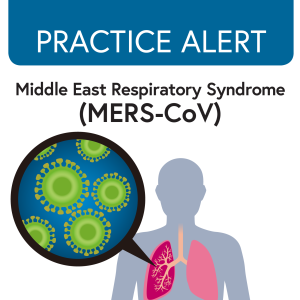Practice Alert: What Nurses Need to Know About MERS-CoV


What is MERS-CoV?
MERS-CoV is a respiratory illness caused by a coronavirus. It is believed that the virus is spread through an infected person’s respiratory secretions, but the exact method of infection is not yet known. There is currently no specific antiviral treatment for MERS-CoV and no vaccine exists to prevent infection. Who is at Risk? At this time the general public in the U.S. is at very low risk. In fact, there have only been two cases of MERS-CoV in the U.S. so far, both in 2014. However, healthcare workers who treat a patient with MERS-CoV are at risk for infection and must be well protected. There have been several instances in other countries where MERS-CoV has spread within healthcare facilities. According to the World Health Organization, more than 25% of reported MERS-CoV cases have been healthcare workers.
What are MERS-CoV Symptoms?
Most patients with MERS-CoV infection experience:
- Fever
- Cough
- Shortness of breath
- Headache
- Muscle pain
Some also experience
- Diarrhea
- Nausea/vomiting
Severe illness often includes complications such as pneumonia and organ failure.
Many people infected with MERS have mild, cold-like symptoms. Some have no symptoms at all. However, pre-existing medical conditions such as diabetes, renal failure, chronic lung disease or a compromised immune system can put infected patients at higher risk for serious complications and death. The MERS-CoV mortality rate is estimated to be approximately 35%.
What is the Incubation Period?
The period between when a person is exposed to MERS-CoV and when they start to have symptoms is usually about 5-6 days, although the incubation period can range from 2-14 days.
Who Should be Evaluated and/or Tested for MERS-CoV?
Persons who meet the following criteria should be evaluated for MERS-CoV:
- Fever AND pneumonia or acute respiratory distress syndrome, AND EITHER:
- History of travel from countries in or near the Arabian Peninsula within 14 days before symptom onset,* OR
- Close contact with a symptomatic traveler who developed fever and acute respiratory illness within 14 days after traveling from countries in or near the Arabian Peninsula,* OR
- History of being in a healthcare facility in South Korea within 14 days before symptom onset,* OR
- Close contact with a confirmed MERS-CoV case while patient was ill.
*This list may change if additional cases are identified in other geographic areas.
How Should Healthcare Workers Be Protected?
Healthcare workers (HCWs) who may come in contact with a patient under investigation (PUI) must follow standard, contact and airborne precautions. The CDC recommends the following steps be taken to limit MERS-CoV transmission in the healthcare setting:
- PUI should be masked, if possible, and placed in an airborne infection isolation room (AIIR). If an AIIR is not immediately available, PUI should be placed in isolation and, as soon as possible, transferred to an AIIR.
- HCWs coming in close contact with PUI should wear the following personal protective equipment (PPE):
- Gloves
- Gown
- Face shield or goggles
- N95 respirator or respirator with higher level of protection (NYSNA recommends that a PAPR be used whenever a HCW comes into close contact with a PUI, and especially during aerosol-generating procedures)
REMEMBER: Good hand hygiene, including washing with soap and water or using an alcohol-based hand sanitizer, is one of the best ways to control the spread of infection.
What Steps Should My Hospital Be Taking to Protect Both Staff and Patients?
Quick identification and isolation are key to protecting both HCWs and other patients. Healthcare facilities should take the following steps to limit worker, patient and visitor exposure:
- Train all employees on MERS-CoV symptoms, modes of transmission, etc. as well as facility infection control procedures including identification, isolation and treatment.
- When scheduling appointments, instruct patients and visitors to call ahead to inform HCWs if they have symptoms of respiratory infection. If yes, patients should be asked if they have traveled from the Arabian Peninsula within the past 14 days or if they were in a healthcare facility in South Korea within the past 14 days or have been in close contact with a known MERS-CoV patient within the past 14 days.
- Put procedures in place to quickly triage and isolate PUIs.
- If triage is not conducted immediately upon patient entry into the facility, put procedures in place to identify patients at risk for having MERS-CoV prior to patient triage or registration.
- Ensure that all persons with symptoms of respiratory infection adhere to respiratory hygiene and cough etiquette including having PUI wear a facemask if medically feasible.
- Post multilingual signs or posters throughout the facility, but particularly at entry points and waiting areas, regarding hand and respiratory hygiene as well as cough etiquette. Signs should also instruct patients and visitors to notify healthcare personnel if they have respiratory symptoms and have recently traveled from the Arabian Peninsula or were in a healthcare facility in South Korea.
- Make sure adequate PPE is available for HCWs who may come in contact with PUIs. Workers must be trained on proper donning and doffing protocols. Workers must also be fit tested and medically cleared in order to wear respiratory protection.
- Review and update, if necessary, infection control policies and procedures to make sure MERS-CoV control measures are included.
- Put in place policies and procedures related to performing aerosol-generating procedures on PUIs.
- Put in place monitoring protocols for employees who have come in close contact with PUIs.
- Establish procedures for monitoring, managing and training of visitors, including limiting visitor access.